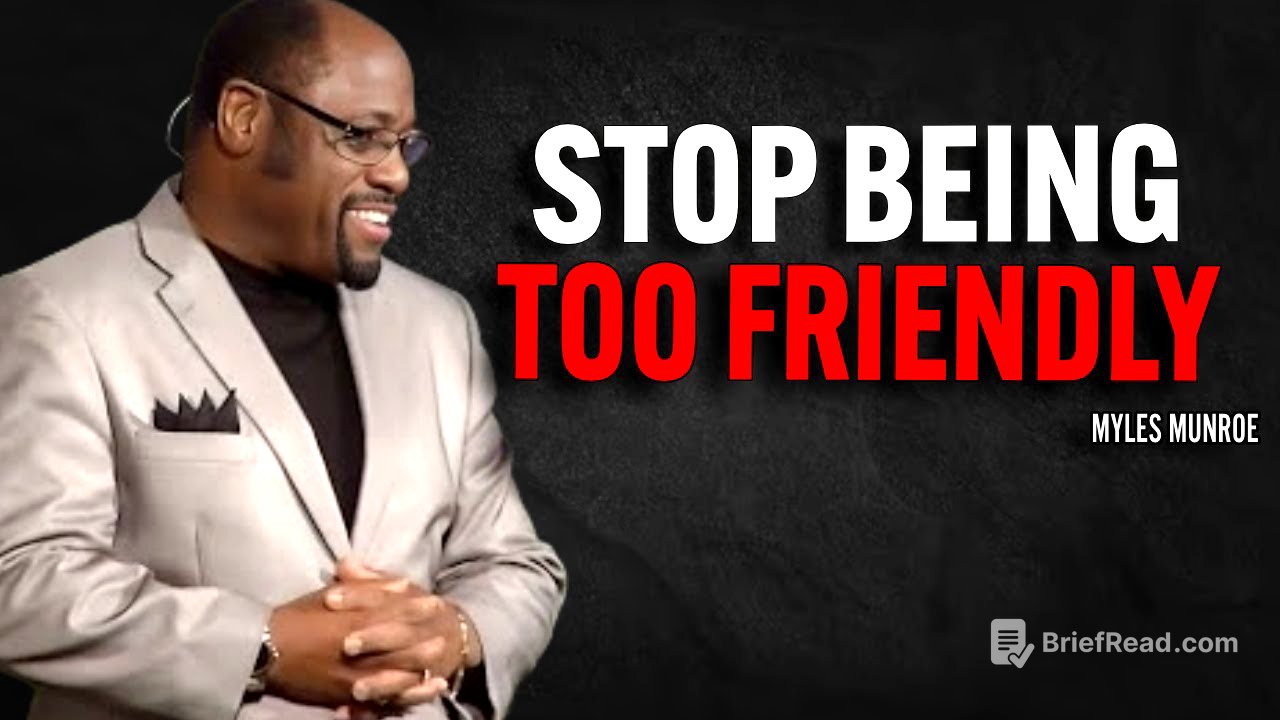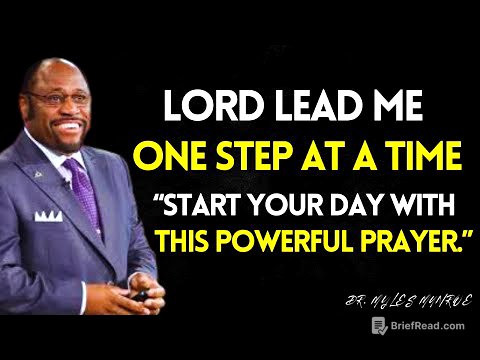TLDR;
This video discusses how being excessively nice and people-pleasing can be detrimental to one's personal growth, energy, and purpose. It emphasizes the importance of setting boundaries, prioritizing one's own goals, and understanding that true respect comes from self-worth, not from constant compliance. The video provides practical steps to stop being too friendly and align one's actions with their true purpose, illustrated with real-life examples.
- Being too friendly leads to exhaustion, resentment, and loss of respect.
- Setting boundaries is essential for healthy relationships and personal fulfillment.
- Aligning your priorities with your purpose is crucial for making a meaningful impact.
Introduction: The Hidden Cost of Being Nice [0:00]
Being excessively nice and always saying yes can be self-destructive, hindering personal potential and purpose. Sacrificing one's dreams for the sake of popularity or approval leads to a diminished version of oneself. The video challenges the notion that constant friendliness equates to being a better person, arguing instead that it often results in neglecting one's own goals and aspirations. It sets the stage for exploring how to balance kindness with the necessity of prioritizing one's own well-being and purpose.
How Constant People-Pleasing Destroys Your Energy [2:36]
Trying to please everyone results in unbalanced relationships where others expect sacrifices and feel entitled to one's time and energy. The most dangerous aspect of being too friendly is the shift in self-perception, where one's value is measured by how much they give away rather than by their true purpose. This behavior becomes a form of self-sabotage, leading to exhaustion and resentment.
The Story of Working Until 2 AM for Someone Else [5:18]
The speaker shares a personal anecdote of working late into the night on a colleague's project, neglecting their own dreams and goals. This experience led to the realization that being too friendly was actually foolish, sacrificing personal purpose for the sake of popularity. The story illustrates the dangers of prioritizing other people's needs over one's own, emphasizing the importance of valuing one's time and resources.
What Happens When You're Too Friendly (Exhaustion, Resentment) [8:11]
Being too friendly leads to exhaustion, as energy is finite and giving it away without aligning with one's purpose means sacrificing potential. Resentment builds as one consistently sacrifices for others, poisoning relationships. Furthermore, people lose respect for those who don't respect themselves, sending the message that one's time, boundaries, and purpose are not important. Ultimately, this can lead to missing one's destiny.
How Setting Boundaries Creates Better Relationships [11:05]
Boundaries are presented as bridges that create conditions for authentic connection, not walls that disconnect people. Clear boundaries help others understand expectations and value one's time, paradoxically increasing their respect. Setting boundaries is framed as responsible stewardship of one's gifts, talents, resources, and time, essential for fulfilling one's purpose.
The Marcus Story: From Doormat to Success [13:42]
The story of Marcus illustrates the transformation from being a people-pleaser to achieving success by setting boundaries. Initially, Marcus worked excessively to avoid disappointing others, neglecting his own dreams. After realizing his value was not in what he could do for others, he set boundaries, which led to the start of his own business and a more fulfilling life. The people who truly cared about him respected his boundaries, strengthening those relationships.
Your Time Is Not Renewable: Protecting Your Resources [16:34]
Time is a non-renewable resource, and every minute spent on activities misaligned with one's purpose is lost forever. Saying yes to unimportant things means saying no to important ones. It's crucial to become focused rather than selfish, recognizing that one cannot be all things to all people. The greatest gift to the world is one's authentic contribution, purpose fulfilled, and potential realized.
The Power of Saying "No" (And How to Do It Gracefully) [19:28]
Many people live without setting boundaries, becoming human doormats and wondering why they feel empty. The key to freedom is learning to say no to what doesn't serve one's purpose, creating space for what does. Saying no is a protection of oneself, time, energy, and purpose, acknowledging that resources are finite and must be managed wisely.
Signs of Toxic Relationships You Need to Address [22:17]
Some relationships are toxic, draining energy and hindering purpose. Signs of such relationships include feeling exhausted after spending time with them, a consistent imbalance in give and take, resistance to boundaries, and discomfort with one's success. Creating distance or ending these relationships may be necessary to protect one's priorities and purpose.
Aligning Your Purpose with Your Priorities [25:06]
True commitment is revealed through priorities, not just stated intentions. If priorities don't align with one's stated purpose, either the priorities or the purpose must change. Being too friendly often leads to a misalignment between purpose and priorities, where one's actions contradict their values.
Six Practical Steps to Stop Being Too Friendly [27:52]
Practical steps to stop being too friendly include: clarifying one's purpose, auditing current commitments, creating scripts for saying no, starting small, expecting resistance, and surrounding oneself with boundary respecters. Celebrating progress is also important to reinforce positive changes.
Conclusion: From People-Pleaser to Difference-Maker [29:43]
The story of Sophia illustrates how setting boundaries can lead to increased positive impact. By focusing on one area and delegating tasks, she achieved greater results and improved her well-being. The video concludes by encouraging viewers to stop being too friendly with what doesn't matter, so they can be fully committed to what does, transitioning from people-pleasers to difference-makers.









